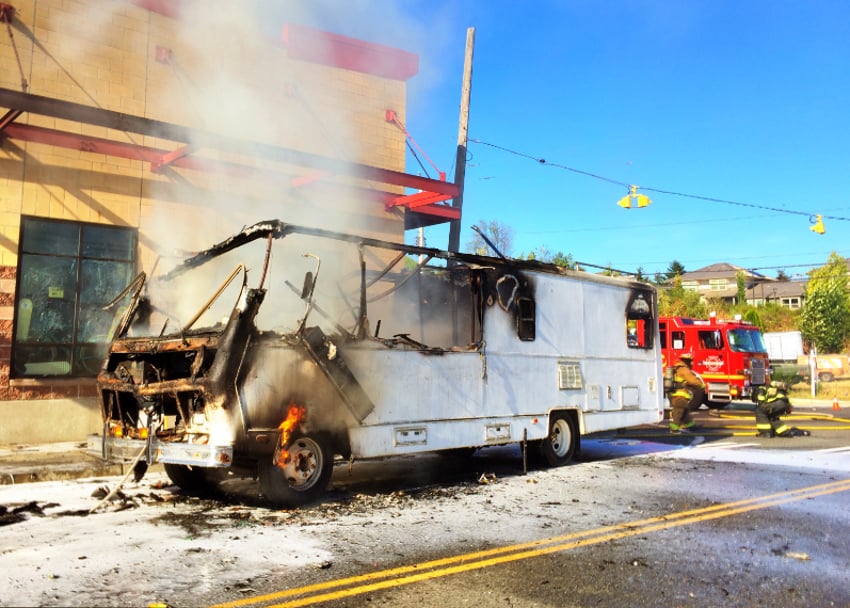One minute you’re broiling a tasty dinner in your RV oven, the next you’re running for your life. In the confined space of a home on wheels, even a small RV kitchen fire can destroy your rig in seconds.
When you’re cooking on the road, be alert for some of the potential causes of fires that may be lurking in your kitchen.

Do you have RV kitchen fire dangers in your rig? Image courtesy Patrick Robinson.
Cooking fires are the number one cause of home fires and injuries, according to the National Fire Protection Association. What causes most of them? Usually when someone isn’t keeping an eye on the food being cooked. Besides monitoring your flaming stove top, be on guard for these scary RV kitchen fire dangers.
1. Combustibles near the stove
We all like to add a personal touch to our RV kitchens. For many of us that means hanging cute potholders and dishtowels around the galley. Some of us also hang our paper towels there too.
But have you ever considered that one wind gust could blow those combustibles right onto your stove top flame and ignite a devastating fire? Move your paper products, dish towels, and other combustibles as far away as possible from any flame source.
2. Opening the oven door when you see smoke
A RV kitchen fire starts because it’s fed by fuel, oxygen and heat. If you see smoke pouring from your RV oven, stop and remember that the oven is not on fire, just your food.
“Ovens are designed to hold in heat and if needed, fire,” says retired fire service RVer and iRV2 Forums member Firebug5. Keep the oven door closed to remove the oxygen source and turn off the oven. Get out of the kitchen and call 911.
3. Using water to extinguish a flame
Reaching for water when fire gets out of control is human instinct. Unfortunately using water to extinguish a RV kitchen fire is a bad idea. Here’s why:
Water just makes it worse
Dump water on your RV kitchen fire and you’ll cause the flame to scatter in all directions. Fire experts at the National Fire Protection Association advise keeping a lid beside your pan when cooking.
“If you have a fire, slide the lid over the pan and turn off the burner. Do not remove the cover because the fire could start again. Let the pan cool for a long time. Never throw water or use a fire extinguisher on the fire.”
4. Being careless with cooking oil
A RV kitchen fire can also ignite when cooking oil gets too hot. Even if a flame never touches your pan, oil that’s too hot can spontaneously ignite. Further, if smoke rises from hot oil on your stovetop, that’s a clue to turn off the heat, move the pan away and place a lid over it.
RV fire expert Mac the Fire Guy suggests keeping a box of baking soda on the kitchen counter. Since baking soda is the ingredient in powder extinguishers, you can use it to put out minor flare ups contained in the pan.
If you try the baking soda method, pour it from a few feet away since dumping it into the pan can spread the fire outward.
More preventative action
RV galleys are small and a fire can spread in the blink of an eye. After cooking duties, be sure the oven is turned off and stoves are cool before replacing cooktop covers (or resting flammable products on top). If you are on an extensive trip (or any trip for that matter) it’s always best to be ready for RV catastrophes in the aftermath of a severe fire.
Nobody expects to suffer the effects of a RV kitchen fire, but when it happens, you could lose everything—including your life! Don’t wait. Learn the importance of fighting a RV fire and educate yourself about fire extinguishers for the RV to keep your family safe on the road.

Thanks. Those are all good precautions and suggestions regarding cooking inside your rig. Our solution is that we do VERY little cooking inside the rig; we set up and do the majority of our cooking outside. It not only keeps the danger of fire down, it also keeps cooking smells and heat from accumulating inside the RV. What cooking we do inside is usually in the Microwave/Convection Oven. Electric.
One of my biggest worry s on the road when we travel is, refrigerator fires. Ive seen several pictures on U Tube of burning class A motor homes. It appears there is something in that area that has caused the fire. I don’t know if it only happens when your traveling and something goes honorably wrong, or if it can happen any time. But if that would happen at night time when we were asleep it would be fatal, as the fridge is between us and the front door, and that rear window with the escape handles in a panic could prove a bad thing as the deer wife and I both try to get out that way. Is there a way to know what if anything can prevent those type of fires?